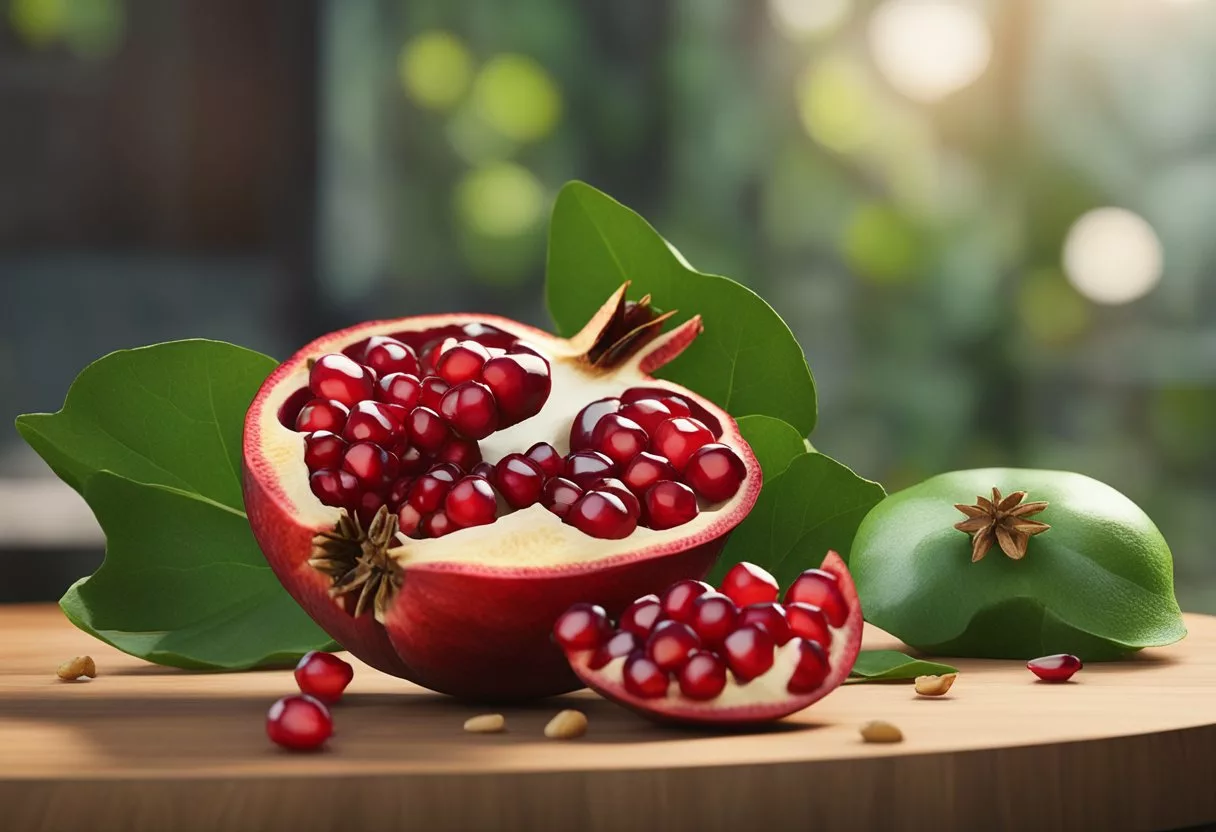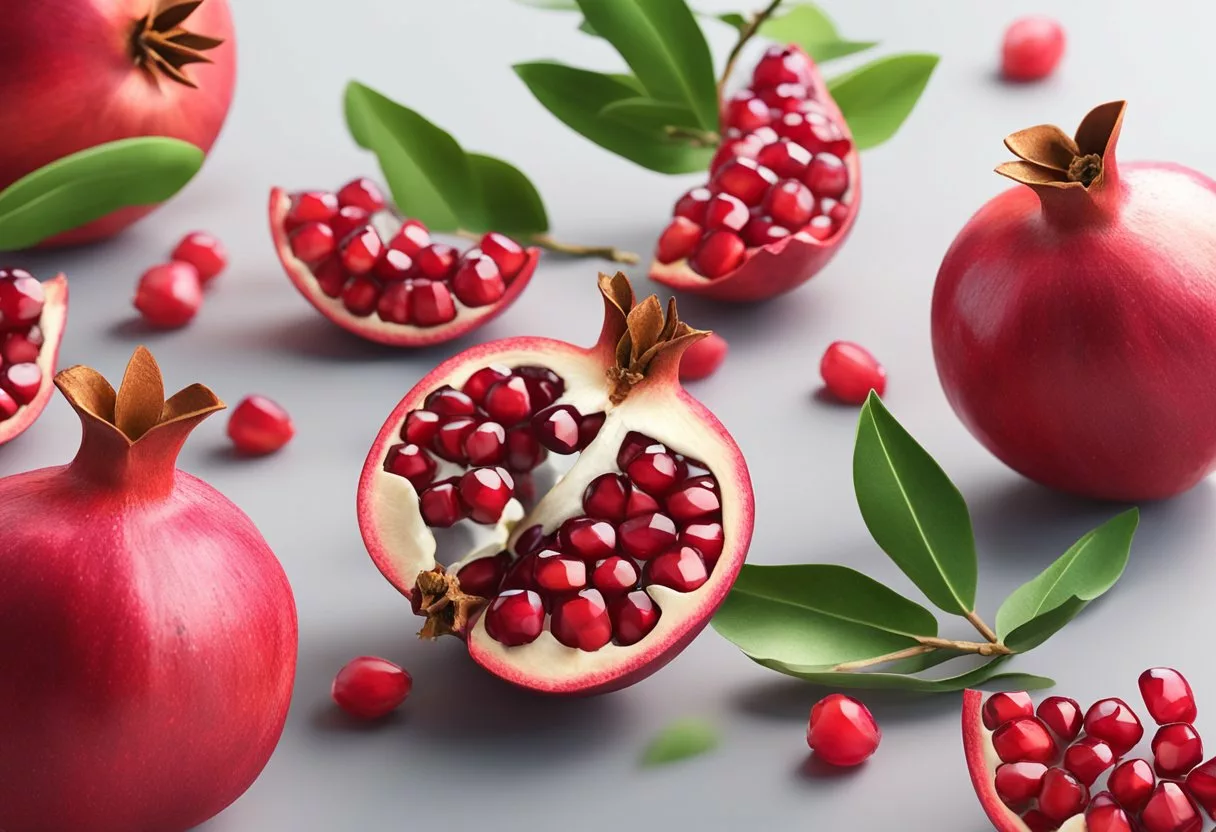Pomegranates are a fruit that have been enjoyed for centuries for their sweet and tangy taste. They are also known for their many health benefits.
Pomegranates are low in calories and high in fiber, vitamins, and minerals. They also contain antioxidants and other compounds that may help prevent disease, improve heart health, and support digestion.

The nutritional profile of pomegranates is impressive. They are a good source of vitamin C, vitamin K, and potassium.
They also contain polyphenols, which are powerful antioxidants that can help protect the body against damage from free radicals.
In addition, pomegranates are a good source of fiber, which can help promote digestive health and reduce the risk of chronic disease.
From disease prevention to skin and beauty, weight management, exercise and performance, and dietary uses, there are many reasons to add pomegranates to your diet. However, there are also some risks and considerations to keep in mind, such as the potential for allergic reactions and interactions with certain medications.
Key Takeaways
- Pomegranates are a low-calorie, high-fiber fruit that are rich in vitamins, minerals, and antioxidants.
- Pomegranates may help prevent disease, improve heart health, and support digestion.
- While pomegranates offer many health benefits, it’s important to be aware of potential risks and considerations.
Nutritional Profile

Pomegranates are a nutrient-rich fruit that offer a variety of essential vitamins and minerals. This section will explore the nutritional profile of pomegranates, including their vitamin and mineral content, fiber content, and antioxidant composition.
Vitamins and Minerals
Pomegranates are a good source of several essential vitamins and minerals.
One medium-sized pomegranate contains approximately 28 milligrams of vitamin C, which is about 46% of the recommended daily intake for adults.
They are also a good source of potassium, with one pomegranate containing approximately 666 milligrams, or 14% of the recommended daily intake for adults.
In addition, pomegranates contain folate, magnesium, calcium, and vitamin K.
Fiber Content
Pomegranates are high in fiber, with one medium-sized fruit containing approximately 7 grams of fiber. This makes them an excellent choice for individuals looking to increase their fiber intake.
Fiber is important for maintaining digestive health and can also help lower cholesterol levels.
Antioxidant Composition
Pomegranates are rich in antioxidants, which are compounds that help protect the body against damage from harmful molecules called free radicals.
One study found that pomegranate juice has three times the antioxidant activity of red wine and green tea.
Pomegranates contain several different types of antioxidants, including polyphenols, tannins, and anthocyanins.
Health Benefits

Pomegranates are a rich source of antioxidants, which help protect the body against damage caused by free radicals. They also have anti-inflammatory properties, which can help reduce the risk of chronic diseases.
Heart Health
Studies have shown that pomegranates can promote heart health by reducing the risk of heart disease.
The fruit contains compounds that help reduce inflammation, which is a major contributor to heart disease.
Pomegranate juice has also been shown to lower blood pressure, which is another risk factor for heart disease.
Blood Pressure Regulation
Pomegranates have been shown to have a positive effect on blood pressure regulation.
The fruit contains compounds that help relax blood vessels and improve blood flow.
This can help reduce the risk of hypertension, a condition that can lead to heart disease and stroke.
Anti-Inflammatory Effects
Pomegranates have anti-inflammatory properties, which can help reduce the risk of chronic diseases.
The fruit contains compounds that help reduce inflammation in the body, which is a major contributor to many chronic diseases, including heart disease, cancer, and Alzheimer’s disease.
Cancer Prevention
Studies have shown that pomegranates may have cancer-fighting properties.
The fruit contains compounds that help prevent the growth of cancer cells and may even cause cancer cells to die.
Pomegranate juice has been shown to inhibit the progression of prostate cancer.
Digestive System Support
Pomegranates may help support digestive health.
The fruit contains fiber, which can help regulate bowel movements and prevent constipation.
Pomegranate juice has also been shown to have a positive effect on gut bacteria, which can help improve overall digestive health.
Cognitive Function Improvement
Pomegranates may also have a positive effect on cognitive function.
Studies have shown that the fruit may help improve memory and reduce the risk of Alzheimer’s disease.
The fruit contains compounds that help protect brain cells from damage and may even promote the growth of new brain cells.
Disease Prevention

Pomegranates have been shown to have a number of health benefits, including disease prevention. Here are some of the ways that pomegranates may help prevent or manage certain diseases:
Diabetes Management
Pomegranates may help manage type 2 diabetes by improving insulin sensitivity and reducing inflammation.
A study published in the journal Atherosclerosis found that drinking pomegranate juice for three months helped improve insulin sensitivity in people with type 2 diabetes.
Another study published in the journal Nutrition Research found that drinking pomegranate juice helped reduce inflammation in people with type 2 diabetes.
Urinary Health
Pomegranates may also help improve urinary health.
A study published in the Journal of Ethnopharmacology found that pomegranate extract helped reduce symptoms of urinary tract infections in rats.
Another study published in the Journal of Medicinal Food found that pomegranate juice helped reduce the risk of urinary tract infections in women.
Prostate Cancer Risk Reduction
Pomegranates may also help reduce the risk of prostate cancer.
A study published in the Journal of Medicinal Food found that pomegranate juice helped slow the growth of prostate cancer cells in rats.
Another study published in the journal Clinical Cancer Research found that drinking pomegranate juice helped slow the progression of prostate cancer in humans.
Skin and Beauty

Pomegranate has been used for centuries as a natural remedy for various skin conditions. Recent research has shown that pomegranate contains several compounds that can benefit the skin and improve overall skin health.
Anti-Aging Properties
Pomegranate is rich in antioxidants that can help protect the skin from damage caused by free radicals.
Free radicals are unstable molecules that can damage cells and contribute to the aging process.
The antioxidants in pomegranate can help neutralize these free radicals and protect the skin from premature aging.
Pomegranate also contains compounds that can help stimulate collagen production.
Collagen is a protein that gives the skin its structure and elasticity. As we age, collagen production decreases, leading to wrinkles and sagging skin.
By stimulating collagen production, pomegranate can help improve skin elasticity and reduce the appearance of fine lines and wrinkles.
Skin Health
Pomegranate has been shown to have several benefits for skin health.
It contains punicic acid, an omega-5 fatty acid that can help hydrate and soothe dry, irritated skin.
Pomegranate oil can penetrate deeply into the skin, making it effective for treating dry, cracked skin.
Pomegranate also has anti-inflammatory properties that can help reduce redness and inflammation in the skin. This makes it beneficial for those with acne-prone skin or other inflammatory skin conditions.
Weight Management

Pomegranate is a low-calorie snack that can aid in weight management.
One cup of pomegranate arils (seeds) contains only 144 calories, making it a refreshing and satisfying snack option for those trying to lose weight or maintain a healthy weight.
Additionally, pomegranate is low in fat and high in fiber, which can help you feel fuller for longer periods of time.
Low-Calorie Snack
Pomegranate is a great option for those looking for a low-calorie snack.
In fact, one cup of pomegranate arils contains only 144 calories. This makes it a satisfying and refreshing snack option for those trying to lose weight or maintain a healthy weight.
Additionally, pomegranate is low in fat and high in fiber, which can help you feel fuller for longer periods of time.
Metabolic Benefits
Studies have shown that pomegranate may have metabolic benefits.
One study found that pomegranate juice consumption reduced triglyceride levels in overweight and obese individuals.
Triglycerides are a type of fat found in the blood and high levels can increase the risk of heart disease.
Another study found that pomegranate extract improved insulin sensitivity in overweight and obese individuals.
Insulin sensitivity is an important factor in metabolic health as it determines how well the body can use insulin to regulate blood sugar levels.
Exercise and Performance

Pomegranate has been shown to have potential benefits for exercise performance and endurance enhancement.
The fruit contains nitrates, which help dilate blood vessels, leading to increased blood flow and oxygen delivery to the muscles.
This can result in improved endurance and exercise performance.
Endurance Enhancement
A study published in the Journal of Strength and Conditioning Research found that consuming pomegranate extract for 30 days improved endurance performance in trained athletes. The study showed that athletes who consumed pomegranate extract had a significant increase in time to exhaustion during exercise compared to the placebo group.
Another study published in the International Journal of Sport Nutrition and Exercise Metabolism found that consuming pomegranate juice for 15 days improved time to exhaustion during exercise in trained cyclists. The study also found that pomegranate juice consumption led to a lower heart rate during exercise, indicating improved cardiovascular efficiency.
Recovery Acceleration
Pomegranate has also been shown to have potential benefits for recovery acceleration. A study published in the Journal of Strength and Conditioning Research found that consuming pomegranate extract for 10 days reduced muscle soreness and improved muscle recovery following exercise.
Another study published in the Journal of the International Society of Sports Nutrition found that consuming pomegranate extract for 28 days reduced muscle damage and improved muscle recovery following exercise in resistance-trained individuals.
Dietary Uses

Culinary Applications
Pomegranate is a versatile fruit that can be used in a variety of culinary applications. The arils, or seeds, can be eaten raw or used as a garnish for salads, bowls, and smoothies.
Pomegranate juice can be used as a base for cocktails or mixed with other juices for a refreshing beverage. The juice can also be added to oatmeal or yogurt for a nutritious breakfast.
Pomegranate arils can be used in a variety of recipes, including desserts, sauces, and dips. They can also be used to add a pop of color and flavor to savory dishes like roasted vegetables or grilled meats.
Pomegranate molasses, a syrup made from pomegranate juice, can be used as a glaze for meats or as a topping for ice cream.
Recipe Ideas
Here are a few recipe ideas that incorporate pomegranate:
Pomegranate Salad
Ingredients:
- Mixed greens
- Pomegranate arils
- Sliced avocado
- Feta cheese
- Toasted walnuts
- Balsamic vinaigrette
Directions:
- In a large bowl, combine mixed greens, pomegranate arils, sliced avocado, crumbled feta cheese, and toasted walnuts.
- Drizzle with balsamic vinaigrette and toss to combine.
Pomegranate Smoothie
Ingredients:
- 1 cup pomegranate juice
- 1 banana
- 1/2 cup frozen berries
- 1/2 cup Greek yogurt
- 1 tbsp honey
Directions:
- Combine all ingredients in a blender and blend until smooth.
- Serve immediately.
Pomegranate Margarita
Ingredients:
- 2 oz tequila
- 1 oz pomegranate juice
- 1 oz lime juice
- 1/2 oz triple sec
- Salt for rim
Directions:
- Rim a glass with salt.
- In a shaker, combine tequila, pomegranate juice, lime juice, and triple sec.
- Add ice and shake until chilled.
- Strain into the salt-rimmed glass and serve.
Risks and Considerations

Allergies and Interactions
While pomegranates are generally safe to consume, some individuals may experience allergic reactions to the fruit. Symptoms of an allergic reaction may include itching, swelling, hives, and difficulty breathing. If you experience any of these symptoms after consuming pomegranate, seek medical attention immediately.
Pomegranate may also interact with certain medications, including blood thinners such as warfarin. If you are taking any medications, it is important to consult with your healthcare provider before adding pomegranate to your diet.
Kidney Stone Considerations
Pomegranates contain oxalates, which are compounds that can contribute to the formation of kidney stones in some individuals. If you have a history of kidney stones or are at risk for developing them, it is important to speak with your healthcare provider before consuming pomegranate or pomegranate juice.
It is also important to note that while pomegranate juice has been shown to have potential health benefits, it is high in sugar and calories. Consuming large amounts of pomegranate juice may contribute to weight gain and other health issues. As with any food or beverage, it is important to consume pomegranate in moderation as part of a balanced diet.
Frequently Asked Questions

How can consuming pomegranates improve male sexual health?
Pomegranates contain a high concentration of antioxidants, which can help improve blood flow and reduce oxidative stress in the body. This can lead to improved sexual function in men, including increased libido and improved erectile function. Studies have shown that pomegranate juice can be an effective natural remedy for erectile dysfunction.
What are the health advantages for women who include pomegranates in their diet?
Pomegranates are a rich source of antioxidants, vitamins, and minerals that can help support overall health and well-being in women. The high concentration of antioxidants in pomegranates can help reduce inflammation and protect against chronic diseases like heart disease, cancer, and Alzheimer’s disease. Additionally, pomegranates contain compounds that may help regulate hormones and reduce symptoms associated with menopause.
In what ways does pomegranate consumption benefit the skin?
Pomegranates contain a variety of compounds that can benefit the skin, including antioxidants, vitamins, and minerals. These compounds can help protect the skin from damage caused by free radicals and UV radiation, reduce inflammation, and improve skin hydration. Studies have also shown that pomegranate extract can help improve skin texture and reduce the appearance of wrinkles and fine lines.
Can pomegranates aid in weight loss efforts, and if so, how?
Pomegranates are a low-calorie, high-fiber food that can be a healthy addition to a weight loss diet. The high fiber content of pomegranates can help promote feelings of fullness and reduce overall calorie intake, while the low calorie content can help support weight loss efforts. Additionally, pomegranates contain compounds that may help regulate metabolism and reduce inflammation, which can further support weight loss efforts.
What nutritional value do pomegranates provide?
Pomegranates are a rich source of vitamins, minerals, and antioxidants. One cup of pomegranate seeds contains approximately 24 grams of carbohydrates, 7 grams of fiber, and 3 grams of protein. Pomegranates are also a good source of vitamin C, vitamin K, folate, and potassium.
Is there a significant sugar content in pomegranates?
While pomegranates do contain natural sugars, they are not considered a high-sugar food.
One cup of pomegranate seeds contains approximately 24 grams of carbohydrates, 7 grams of fiber, and 14 grams of sugar.
However, the high fiber content of pomegranates can help slow down the absorption of sugar in the body. This can help prevent blood sugar spikes.